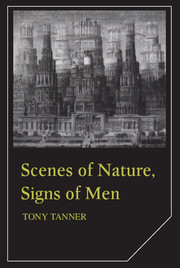Book contents
- Frontmatter
- Contents
- Preface
- 1 Scenes of nature, signs of men
- 2 Notes for a comparison between American and European Romanticism
- 3 Problems and roles of the American artist as portrayed by the American novelist
- 4 James on Hawthorne
- 5 The lost America – the despair of Henry Adams and Mark Twain
- 6 Henry James and Henry Adams
- 7 William Dean Howells and A Hazard of New Fortunes
- 8 Stephen Crane
- 9 The Bostonians and the human voice
- 10 Games American writers play: ceremony, complicity, contestation, and carnival
- 11 Toward an ultimate topography: the work of Joseph McElroy
- 12 Frames and sentences
- 13 William Gass's barns and bees
- Index
13 - William Gass's barns and bees
Published online by Cambridge University Press: 01 June 2011
- Frontmatter
- Contents
- Preface
- 1 Scenes of nature, signs of men
- 2 Notes for a comparison between American and European Romanticism
- 3 Problems and roles of the American artist as portrayed by the American novelist
- 4 James on Hawthorne
- 5 The lost America – the despair of Henry Adams and Mark Twain
- 6 Henry James and Henry Adams
- 7 William Dean Howells and A Hazard of New Fortunes
- 8 Stephen Crane
- 9 The Bostonians and the human voice
- 10 Games American writers play: ceremony, complicity, contestation, and carnival
- 11 Toward an ultimate topography: the work of Joseph McElroy
- 12 Frames and sentences
- 13 William Gass's barns and bees
- Index
Summary
William Gass was born in 1924. In his own words: ‘I was born in Fargo, North Dakota, but my family left there when I was six months old and moved to Warren, Ohio, where I grew up. Then I had three-and-a-half years in the Navy in World War II, attended Kenyon and Cornell, partly on the GI Bill, and I started right out teaching philosophy at the College of Wooster, Ohio. I was there for four years and then went to Purdue, where I have remained ever since.’ (That was in an interview in the Chicago Daily News, I February 1969. Since then he has moved to Washington University in St Louis, where he is currently a professor of philosophy.) In that same interview, Gass answered questions about his childhood very frankly.
I had an awful home, I think it could be described as a childhood of absolute misery. I suppose everybody tends to think this way up to a point, but it was really a wretched household. It was not dramatically bad, it was self-contained within the four walls, and the people in it were rotting, and I really mean rotting. My mother ended up an alcoholic who died in an insane asylum … They [his parents] were both hiding from themselves all the time, hiding their misery. They needed one another as someone needs the person he hates because these are all the emotions he has left. […]
- Type
- Chapter
- Information
- Scenes of Nature, Signs of MenEssays on 19th and 20th Century American Literature, pp. 248 - 274Publisher: Cambridge University PressPrint publication year: 1987



